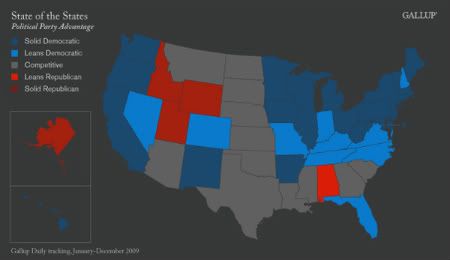The Raw Politics of Immigration Reform Should Lead to Legislation
There are numerous reasons why it would be wise for Washington to address the nation&'s failed immigration policies sooner rather than later and finally fix a system that no one on either end of the political spectrum believes is either functioning properly or serving the best interests of the people . Even though studies show that reforming immigration would be a boost to the economy at a time when it could surely use one, and human rights issues make reforming the system a moral imperative, many still believe that it's an issue too politically hot to handle. ----------------- 1. Fact Sheet: How Immigration Reform Would Help the Economy A fact sheet summarizing recent research on the benefits of legalization. 2. “The Economic Benefits of Comprehensive Immigration Reform” This report finds that comprehensive immigration reform that includes a legalization program for unauthorized immigrants and enables a future flow of legal workers would result in a large economic benefit—a cumulative $1.5 trillion in added U.S. gross domestic product over 10 years. In stark contrast, a deportation-only policy would result in a loss of $2.6 trillion in GDP over 10 years. 3. Restriction or Legalization? Measuring the Economic Benefits of Immigration Reform A report which finds that legalization of low-skilled immigrant workers would yield significant income gains for American workers and households. It would also allow immigrants to have higher productivity and create more openings for Americans in higherskilled occupations. The positive impact for U.S. households of legalization under an optimal visa tax would be 1.27 percent of GDP or $180 billion. 4. The Economics of Immigration Reform: Legalizing Undocumented Workers a Key to Economic Recovery April 2009 analysis of how legalization would protect our workers, raise wages, and get our economy moving again. 5. Policy Brief: New Immigration Reform Bill Supports America’s Middle Class A Legislative Analysis of the Comprehensive Immigration Reform for America’s Security and Prosperity Act of 2009(H.R. 4321) sponsored by Representative Solomon Ortiz (D-TX), Rep. Luis Gutierrez (D-IL) and 92other co-sponsors 6. The Labor Movement’s Framework for Comprehensive Immigration Reform Announced in April 2009, this is the labor movements unified framework for comprehensive immigration reform. This framework is a critical sign of support for the Administration and Congress to address immigration reform -- and to ensure that it remains a priority on the legislative calendar. It is also an important sign that immigration reform is an important part of economic recovery. 7. Loving Thy Neighbor: Immigration Reform and Communities of Faith This report documents how a wide range of faith groups are showing a new, unexpected, and grassroots-led social activism that’s rooted in theological and moral ground. While loud and shrill anti-immigrant voices dominate much of the media attention regarding immigrants and especially the undocumented, faith community activists are caring and praying in the shadows of public attention. 8. The Role of Local Police: Striking a Balance Between Immigration Enforcement and Civil Liberties While this report focuses on and provides critique of the role of local police and immigration enforcement, one of the major findings is the need for enactment of comprehensive immigration reform legislation.
Since nothing yet has provided the requisite motivation to those in Washington to move forward and tackle reform, it&'s time to start to look at it through a prism they can understand: Pure Machiavellian political calculation.
As has been rightly pointed out, reform cannot be a one party affair, and to get it accomplished there will have to be some reaching across the aisle and bipartisan compromise. Yet, given the current polarization in Washington, accomplishing such a task might seem to be impossible ... until of course we look at the alternatives.
It's quite obvious at this point that the American electorate is furious, with discontent across the political spectrum from left to right ... and more importantly the middle.
Confidence in Washington is approaching record lows with few having faith in elected officials to fix the serious problems facing the nation. 60% believe that the country's heading in the wrong direction. The elation of 2008 that a new era of change was upon us, and that the gridlock and partisan politics of the past might finally give way to effective governance, has quickly given way to distrust and cynicism.
Those from both parties now face an angry public more intent than ever to throw the bums out of office.
On the right, all but the most hard-core reactionary conservatives face challenges from the far-right extremes of their party. In Florida, one-time party favorite, Charlie Crist, looks like toast with teabagger Marco Rubio crushing him in the polls. Former standard bearer, John McCain, daily tries to distance himself from every past position he's ever held in hopes of warding off primary defeat. In NY23 the pitchfork and torch crowd lunched a successful coup, driving out the party favorite, ultimately handing the election to the opposition.
Fueled by the vitriolic rants of Glenn Beck or Rush Limbaugh, and living in an information isolation-bubble created by the FOX News noise machine, the angry mob has become emboldened and threatens to tear their party apart in a frenzy of fratricide.
On the left, the inability of the administration and its Congressional allies to deliver on their promise to usher in a new era in Washington has had a different effect. While the right-wing base is energized, the historic coalition that Obama built of youth, ethnic voters, and independents is withering away due to ambivalence and disillusion.
As we saw in NJ, VA, and most recently in MA, the Obama coalition simply failed to show up at the polls. And those that did were the disenchanted independents still looking for change who thought they'd find it in a pick-up truck driving, faux-populist, "independent Republican."
But as much as both parties are having problems with their respective bases, it's the magic 40+% unaffiliated voters who now create the most problems for both.
They're sick and tired of the partisan bickering, political posturing, and gridlock that prevail in Washington.
They're scared. They see a faltering economy, endless wars, high unemployment and an uncertain future, and they want something done.
They watched the protracted political sausage making that mired down the health care debate, the convoluted economics of the stimulus bill, and the daily theater of the absurd as obstructionist Republicans did everything in their power to derail an Obama presidency ... and they're fed up.
They want to clean house, and few incumbents will be safe from their wrath.
Realizing this, both parties have telegraphed their electoral strategies.
Republicans will attempt to run as outsiders, trying to convince voters that somehow Washington careerists are in fact, fresh faces with new ideas, all along stalling and trying their damnedest to prevent anything from getting accomplished that might make Obama look good.
The Democrats, with Obama in the lead, will hammer away on those very same stall tactics and try to lay the blame for all the gridlock and partisan rancor in Washington at the Republican's feet.
But both these plans contain Achilles heels that could doom them to failure.
As a new poll just released by non-partisan independent pollster Research 2000 of over 2,000 self-identified Republicans shows, the base has moved so far to the extreme they could become toxic for incumbents in all but the reddest of red states. Particularly given Obama's still very high personal popularity.
In order to paint themselves as outsiders, Republicans, who make up only 22.5% the electorate, will be forced to embrace those in their party who have already firmly staked out that ground ... the teabaggers and birthers who flocked to last summers town halls to "take their country back."
Having to cater to this constituency not only to ward off primary challenges or raise funds, but to appear "mavericky" enough, Republicans run the risk of alienating the independents and moderates essential to winning general elections. In many ways, in order to remain viable in general elections dominated by centrist independents, Republicans will need to distance themselves from what now appears to be the public face of their party.
A recent Gallup poll shows just how risky catering to the base could be. It's still a very blue country: Overall, 49% of Americans in 2009 identified as Democrats or said they were independent but leaned to the Democratic Party, while 41% identified as Republicans or were Republican-leaning independents In total, 23 states plus the District of Columbia can be classified as solidly Democratic, with a 10 percentage-point or greater advantage in party affiliation in favor of the Democrats. This includes most of the Northeast and mid-Atlantic regions, most of the Great Lakes region, and the Pacific Coast.
Another 10 states can be considered Democratic leaning, in which the state's Democratic supporters outnumber Republican supporters by at least 5 percentage points but less than 10 points. These are Missouri, Kentucky, North Carolina, Florida, New Hampshire, Virginia, Colorado, Nevada, Indiana, and Tennessee.
Four states are solidly Republican, with a better than 10-point advantage in Republican affiliation -- Wyoming, Utah, Alaska, and Idaho. Alabama qualifies as the lone Republican-leaning state, with a 6-point advantage in Republican affiliation.
That leaves 12 states that are competitive, with less than a 5-point advantage for either party. Among these 13 states, 6 tilt in a Republican direction: Montana, Nebraska, Mississippi, Texas, North Dakota, and Kansas. Six tilt toward the Democratic Party: Georgia, South Dakota, Louisiana, Arizona, Oklahoma, and South Carolina.
Gallup 
Republicans would need to replicate their "Massachusetts Miracle" across the electoral map in order to succeed … something far easier to crow about, than do.
For Democrats, the "blame it all on the Republicans" strategy is risky also. Congressional Democrats' approval ratings are in the toilet, only slightly higher than the Republicans:
PARTY APPROVE DISAPPROVE CONGRESSIONAL DEMS: 37 59 CONGRESSIONAL GOP: 21 63
This low standing in most part due to their perceived inability to get anything accomplished and getting mired down in the toxic partisan bickering that has marked this Congress.
Attempting now to point fingers at the opposition is a dicey proposition.
With all his substantial personal charms and political skills, even Obama would be walking the fine line between criticizing partisanship and engaging in it… A risky move even in a far less volatile political climate.
It's even riskier when attempted by far less well-liked and politically talented Democrats who run the risk of sounding like they're just making shrill excuses for their bad behavior.
But perhaps both parties would be better served if they actually just did the people's bidding and found a way to get something done. It would serve them well to roll up their sleeves and put partisan political gamesmanship aside long enough to get at least one piece of major legislation passed this session. It would be in both their political best interests.
Republican's would be able to defuse Democratic attacks about being obstructionists and have some claim to the middle at a time when the extreme base of the party appears to be anything but, and Democrats would prove they can get something done.
It's for this reason that the time to address immigration reform has come.
From a purely political point of view this seems to be a no-brainer.
SOME USEFUL INFO ON REFORM
by the Center for American Progress
By Raul Hinojosa for the Center for American Progress and the Immigration Policy Center
by Peter B. Dixon and Maureen T. Rimmer for the CATO Institute
by the Immigration Policy Center
Drum Major Institute for Public Policy
AFL-CIO and Change to Win
by Sam Fulwood III for the Center for American Progress
By Anita Khashu for the Police Executive Research Foundation















 Last Friday night around 11:30 PM, an unidentified Latino man walked down Division Avenue in Patchogue NY.
Last Friday night around 11:30 PM, an unidentified Latino man walked down Division Avenue in Patchogue NY. Candidate Obama, time and time again on the stump promised sweeping, almost revolutionary change.
Candidate Obama, time and time again on the stump promised sweeping, almost revolutionary change. 
















